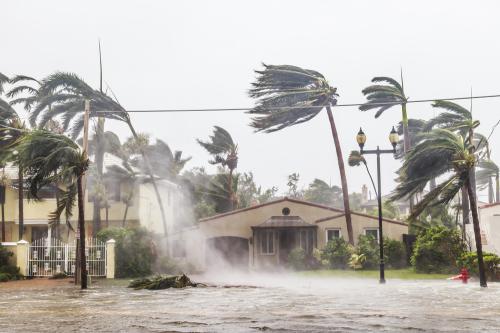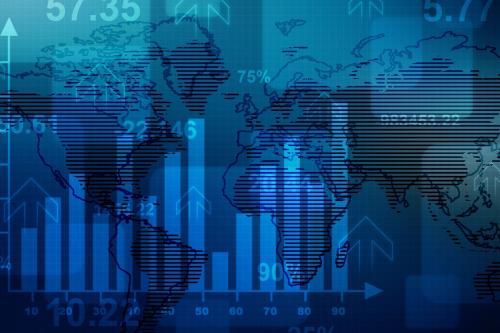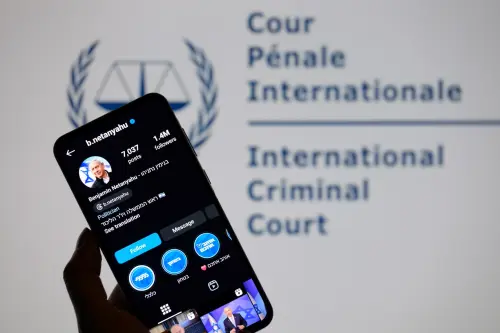“Ukraine may be on everyone’s mind, but it should not dominate … the agenda that President Obama discusses on the [Asia] trip” next week, said Jonathan Pollack during an event today on how the Ukraine/Crimea crisis may affect U.S. response to other international crises in the future—particularly in the Asia-Pacific region.
Pollack, a senior fellow with Brookings’s John L. Thornton China Center and Center for East Asia Policy Studies, was joined by Senior Fellows Kenneth Lieberthal, Michael O’Hanlon and Steven Pifer in a discussion moderated by Visiting Fellow Jeremy Shapiro, who observed that the United States is a “uniquely a global power.” He added that “one of the ways in which our world is interconnected is through the medium of U.S. global power [and] how the U.S. reacts in one region—where resources are drawn, what lessons are drawn about U.S. credibility in one place—has important effects in the other.”
Pifer, a former U.S. ambassador to Ukraine and senior fellow in the Center on the United States and Europe, described a European perspective on President Obama’s visit to Asia in the context of the Ukraine crisis with Russia. “There is an expectation in Europe and also in Ukraine,” he said, “that there will be more American attention” in terms of diplomacy and time devoted to Europe. Pifer outlined America’s three-part policy course—support Ukraine, punish Russia, and bolster NATO—and noted that the third aspect will have particular implications in terms of the “pivot” to Asia. “I think really the challenge here for the pivot,” he said, “is that if you look now at a greater European pull, looking for certainly more time from American diplomacy, from the president, and perhaps even from American military resources, how does that complicate the ability to rebalance toward Asia?”
Pifer said that Europeans will be looking at three things during the president’s Asia trip: whether he uses it to “successfully and credibly convey the image of strong American support for allies there”; will additional resource commitments to Asia possibly take them away from Europe?; and how President Obama responds to questions regarding further steps and sanctions on Russia if the illegal groups in eastern Ukraine haven’t disarmed during the time of his trip. On the second point, about resources, Pifer noted that in the Pacific region, the focus is on U.S. naval and air assets, while for Europe it is more on ground forces, “so there may not be a huge contention over that.”
O’Hanlon, director of research for Foreign Policy at Brookings, argued that the “rebalance” toward Asia “was never a dramatic shift in American resources in the first place.” Citing data on U.S. defense spending, O’Hanlon observed that “at most we planned to reallocate $10 billion” of $600 billion in total defense spending to the Asia-Pacific region, and that Navy ships stationed in the Pacific could still go to the Persian Gulf and other locations if they had to. However, O’Hanlon said, the U.S. lost whatever momentum it had at the end of the first Obama term, “largely because diplomatic attention has moved away from the Asia-Pacific with a change in personnel in the Obama cabinet and top leadership, and also because sequestration has put downward pressure on the defense budget.”
Still, O’Hanlon asserted, the U.S. can get the momentum back “even if we put modest numbers of light ground troops in eastern NATO countries in future months as might be appropriate under the circumstances with Ukraine.” While President Obama has lost momentum in the region, “the good news here is that Crimea, and Ukraine and Putin don’t impede him from reestablishing that Asia-Pacific momentum if he stays focused on the job.”
Pollack offered that the “preeminent goal for President Obama” during his trip is to show that the rebalance toward Asia-Pacific has “staying power” and is “not a code word for counterbalancing of Chinese policy.” He echoed Lieberthal’s view that no choice should be forced between the U.S. and China, but added the same about China and Japan. “A successful strategy,” Pollack said, “has to find some kind of an inclusive concept lest the future of this region go in directions we don’t want to see.”
Pollack spoke directly to the degree to which the Ukraine situation and the West’s response to it may play out in the Asia-Pacific region. “Ukraine may be on everyone’s mind … but it should not dominate, in my view, the agenda that President Obama discusses on the trip,” he said. Continuing:
It is not at present uppermost as an issue for the region as a whole. And it will only become so, and it certainly could, if recent events prefigure a more lasting strategic alienation between the United States and Russia and of course between Russia and Europe. We can find ourselves there, I don’t know that we are there yet, but that’s what we’re here to discuss. Events in Ukraine, even in the next week to 10 days, could divert and distract the president’s larger focus on his goals in the Asia-Pacific region. And in that respect perhaps send the wrong message. It might even be that Vladimir Putin would find it useful to rain on the American parade and to see attention again diverted from [the purpose of his trip] in the context of ongoing events. But we must work hard not to let that happen.
The panelists also focused on how the U.S. and European responses to Russia’s actions in Crimea and Ukraine may affect potential incidents in Asia and what Vladimir Putin’s policies in Asia may look like ahead.
“I think the way in which Mr. Obama has handled Ukraine, and the implications that people will try to draw from that for disputed territories in the East Asia region,” said O’Hanlon, “has generally been fine.” The limited sanctions so far on Putin’s allies and on Russia Bank, discussions with Europeans on alternatives to Russian gas, the possibility of tougher sanctions on Russia, and Putin’s knowledge—from working with the West on Iran sanctions—that sanctions could be ramped up to more effect all represent, for O’Hanlon, “a balanced message which is about right for what China needs to hear and what our allies need to hear about the disputed territories in the East and South China Seas.” He continued:
I don’t think we should go to war against China the minute there’s another altercation if there is one, and there probably will be. I think we need this kind of a balanced approach and in fact we might lead with sanctions there as well. And that may not make every Japanese friend equally happy. That may not make every Filipino friend equally happy. But we have to also show some restraint and judiciousness in how we use military force to respond to crises that may or may not, as bad as they are, be the end of the world.
So my bottom line here is I think Obama goes with a good set of talking points, that the way he’s handled Ukraine should actually be reassuring to the extent people want to try to draw lessons about how we might handle future crisis in east Asia as well.
Lieberthal, a senior fellow with Foreign Policy, Global Economy and Development, and the John L. Thornton China Center, explained how, for the Chinese, “what’s happened in Ukraine gives China problems in almost every dimension.” He said that the “Chinese hate the notion of having a revolution from below supported by the West and recognized as legitimate by the West. And that’s what they see having occurred in the Maidan in Kyiv.” However, the Chinese view territorial integrity as extremely important, “So they don’t like the idea of Crimea quickly having a referendum seen by the central government from the start as illegal.” And thirdly, the Chinese have a strong policy of noninterference in other countries’ internal affairs, which they believe both the U.S. and Russia have done in the Ukraine/Crimea situation. “So there is nothing they see here that looks good to them,” Lieberthal said.
Still, when asked whether “For China, will the way the U.S. has handled this potentially make them more aggressive in pursuing their claims in Southeast Asia and the East China Sea?” Lieberthal responded, “I really don’t think so.”
if this heads south, if this really deteriorates, if our sanctions go from being on Putin cronies and the Russia Bank to sectorial sanctions that lead to much less dependence over time on gas from Russia in Europe, presumably more dependent on us over time, then the Chinese are in a very different position. Because the Chinese and the Xi leadership especially have seen relations with Russia as in many ways a counterbalance to being overly dependent on the U.S. [but especially because] we have long-standing alliances in Asia with most of the countries where the maritime territorial disputes with China are most severe. And we have stated time and again that we will meet our alliance commitments. … We don’t have any such commitments to Ukraine. We don’t have an alliance. We have never assured Ukraine’s territorial integrity by threatening the use of force. We have not tried to make Ukraine a part of NATO. So … it’s a different situation and I think the Chinese are very clear about those differences.
Pollack talked about the need to limit as much as possible Vladimir Putin’s policy options in the Asia-Pacific region. Putin, who is visiting China next month, is, Pollack said,
already making noises about all kinds of expanded collaboration with China. We will have expectations of China in that regard so they don’t simply exploit the situation for their own advantage. Mr. Putin has had five meetings with Prime Minister Abe in the last year and the last thing we would wish to see is that Putin hone in here on such an important and essential relationship to American interests.
And finally I would not preclude a gambit from Mr. Putin to North Korea. The Russians have been very much a kind of marginal factor in the discussions here on the nuclear issue in particular. But it is possible that Putin in his own devious and cunning way will find options to sweeten the deal with Pyongyang in a way that gives North Korea what we repeatedly seek to deny it, more running room—if you will a get out of jail free card. That is something that is going to bear careful consideration in the months to come.
Listen to event audio below; a full transcript of the event will be available soon on the event’s page. The video of C-SPAN’s coverage of this event is available
here
.
The Brookings Institution is committed to quality, independence, and impact.
We are supported by a diverse array of funders. In line with our values and policies, each Brookings publication represents the sole views of its author(s).



Commentary
Ukraine Should not Dominate Obama’s Trip to Asia
April 18, 2014